 This scholarly paper by Pablo Villatoro, published in the CEPAL Review, analyses the "conditional cash transfer programs" that have been implemented in Brazil, Nicaragua, Colombia and Mexico in the last few years. These programs give poor families cash in exchange for sending their kids to school, in order to decrease child labor and increase school participation. Their goal is to "break the intergenerational cycle of poverty."
This scholarly paper by Pablo Villatoro, published in the CEPAL Review, analyses the "conditional cash transfer programs" that have been implemented in Brazil, Nicaragua, Colombia and Mexico in the last few years. These programs give poor families cash in exchange for sending their kids to school, in order to decrease child labor and increase school participation. Their goal is to "break the intergenerational cycle of poverty."[Or, if you prefer, the Spanish version of the article está aquí.]
A pretty substantial body of research is now available on these programs. Villatoro summarizes the findings, showing that the programs are effective at increasing school enrollment for at-risk groups, but their overall impact on child labor is still not clear (some kids on these programs still work after school, and spend less time playing.) Though far from "fun reading," the article provides a valuable guide to the successes and failures the programs have met in those four countries.
More than the ins-and-outs of Conditional Cash Transfers as such, though, I'm interested in the approach to social policy formulation they reveal and the nature of the state-individual nexus they assume. The contrast with what happens in Venezuela is pretty stark:
- Conditional cash transfer programs are carefully designed by social scientists.
- Beneficiaries are chosen according to explicit, objective criteria - they benefit as citizens.
- Effectiveness is carefully monitored on an ongoing basis - in fact, evaluation mechanisms are built into the programs from the start. Impact assesment data are made public for anyone to scrutinize.
- Studies are carried to compare the outcomes in "intervention groups" participating in the programs with outcomes in "control groups" that do not participate - allowing policy-makers to determine a cost-benefit matrix precisely.
- Program designers seek to learn-by-doing, taking on the lessons drawn from evaluation studies and tweaking the programs over time to decrease their costs and increase their impact.
- The overall approach is rigorous, professional and evidence-led as well as transparent.
- Bolivarian misiones are thought up by Chávez on the set of Aló, presidente or in a pétit comité of chavista hacks.
- Beneficiaries are chosen on political grounds, after making sure they did not support Chávez's recall, and their participation is noted as a sign of political allegiance in the Maisanta Software - they benefit as political clients.
- Monitoring and evaluation, if carried out at all, is not published. Nobody can tell you for sure whether the misiones are meeting their social goals or, if they are, at what cost.
- Learning-by-doing is impossible, not only because the programs are not permanent and because the absence of evaluation mechanisms leaves policy-makers in the dark about what's working and what isn't, but also - and more perniciously - because admitting mistakes becomes extremely awkward in a highly politicized atmosphere where the misiones are associated with Chavez personally, and Chavez is idolized as a demigod.
- The overall approach is ad hoc, amateurish, and politically-motivated, as well as opaque.
